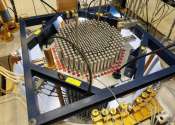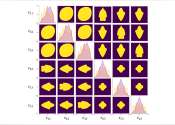Two's a crowd: Nuclear and renewables don't mix
If countries want to lower emissions as substantially, rapidly and cost-effectively as possible, they should prioritize support for renewables, rather than nuclear power.
Oct 5, 2020
24
875
Energy & Green Tech

If countries want to lower emissions as substantially, rapidly and cost-effectively as possible, they should prioritize support for renewables, rather than nuclear power.
Oct 5, 2020
24
875
Energy & Green Tech

A cellphone power source that lasts nine years. An auto-battery pack that lasts nearly a century. A pacemaker that is powered to last 28,000 years.
Energy & Green Tech

The phrase "too much of a good thing" may sound like a contradiction, but it encapsulates one of the key hurdles preventing the expansion of renewable energy generation. Too much of a service or commodity makes it harder ...
Aug 25, 2020
2
411
Energy & Green Tech

From cell phones, to solar power, to electric cars, humanity is increasingly dependent on batteries. As demand for safe, efficient, and powerful energy storage continues to rise, so too does the call for promising alternatives ...
Mar 2, 2020
2
8003
Engineering

Boeing has patented a laser powered propulsion system for airplanes. A number of sites reported on the patent, with eye-rubbing headlines that told the story. The BusinessInsider headline read, "Boeing just patented a jet ...
Energy & Green Tech

The Fraunhofer ISE research institute has announced that Germany set a record high for solar use on June 9—on that day the country's solar power output rose to 23.1 GW—50.6 percent of all electricity demand. The record ...
Energy & Green Tech

An analysis published in the journal Science found that, contrary to a widely held assumption, the high assay low-enriched uranium (HALEU) now being produced with federal subsidies to fuel the next generation of small nuclear ...
Jun 6, 2024
1
85
Engineering

Scientists at EPFL have devised and tested out a new, gamma-noise method for monitoring nuclear reactors non-invasively and from a distance. The new method, tested out on EPFL's CROCUS nuclear reactor, can improve nuclear ...
May 22, 2024
0
62
Engineering

The spread of radioactive isotopes from the Fukushima Daiichi Nuclear Power Plant in Japan in 2011 and the ongoing threat of a possible release of radiation from the Zaporizhzhia nuclear complex in the Ukrainian war zone ...
Apr 10, 2024
0
24
Engineering

Without a map, it can be just about impossible to know not just where you are, but where you're going, and that's especially true when it comes to materials properties.
Mar 29, 2024
0
27
A nuclear weapon is an explosive device that derives its destructive force from nuclear reactions, either fission or a combination of fission and fusion. Both reactions release vast quantities of energy from relatively small amounts of matter; a modern thermonuclear weapon weighing little more than a thousand kilograms can produce an explosion comparable to the detonation of more than a billion kilograms of conventional high explosive. Even small nuclear devices can devastate a city. Nuclear weapons are considered weapons of mass destruction, and their use and control has been a major aspect of international policy since their debut.
In the history of warfare, only two nuclear weapons have been detonated offensively, both near the end of World War II. The first was detonated on the morning of 6 August 1945, when the United States dropped a uranium gun-type device code-named "Little Boy" on the Japanese city of Hiroshima. The second was detonated three days later when the United States dropped a plutonium implosion-type device code-named "Fat Man" on the city of Nagasaki, Japan. These bombings resulted in the immediate deaths of around 120,000 people (mostly civilians) from injuries sustained from the explosion and acute radiation sickness, and even more deaths from long-term effects of ionizing radiation. The use of these weapons was and remains controversial. (See atomic bombings of Hiroshima and Nagasaki for a full discussion.)
Since the Hiroshima and Nagasaki bombings, nuclear weapons have been detonated on over two thousand occasions for testing purposes and demonstration purposes. The only countries known to have detonated nuclear weapons—and that acknowledge possessing such weapons—are (chronologically) the United States, the Soviet Union (succeeded as a nuclear power by Russia), the United Kingdom, France, the People's Republic of China, India, Pakistan, and North Korea. Israel is also widely believed to possess nuclear weapons, though it does not acknowledge having them. (For more information on these states' nuclear programs, as well as other states that formerly possessed nuclear weapons or are suspected of seeking nuclear weapons, see list of states with nuclear weapons.)
This text uses material from Wikipedia, licensed under CC BY-SA